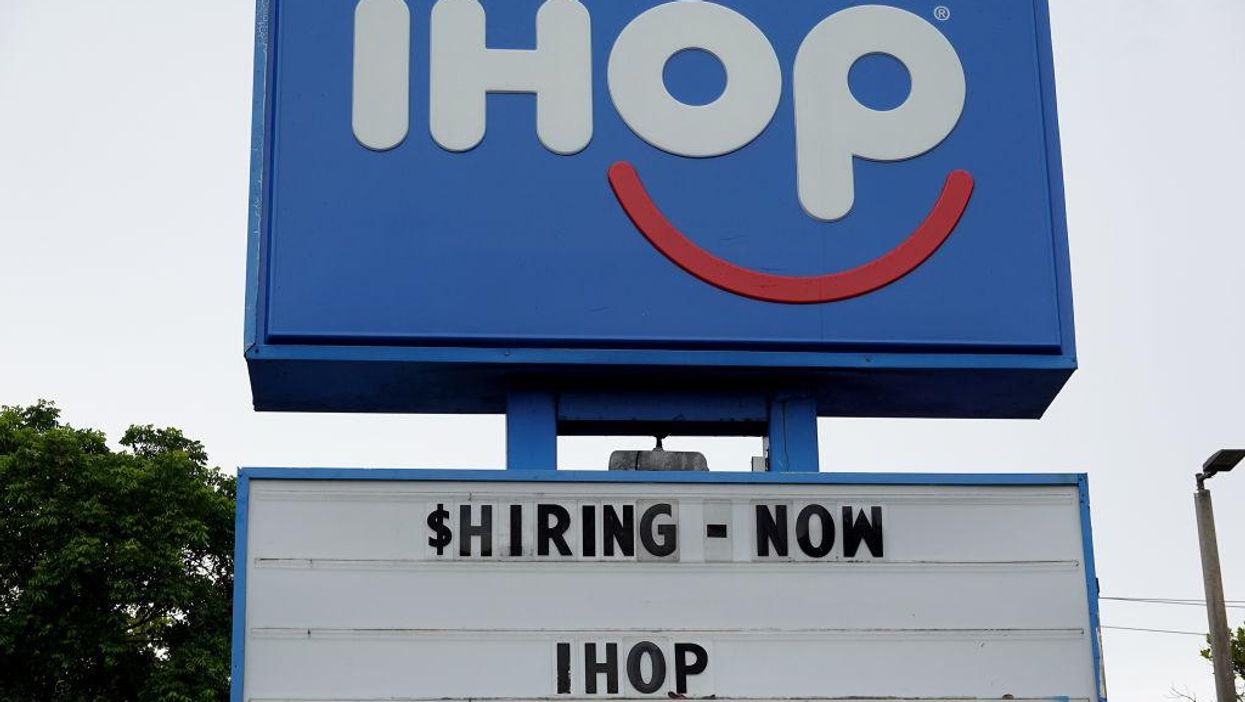
Joe Raedle/Getty Images

New weekly jobless claims have fallen to the lowest level in more than half a century, according to numbers released by the Biden administration Wednesday. At the same time, prices rose at the fastest rate since the early 1990s, as inflation continues to spike.
The Department of Labor reported that seasonally adjusted initial jobless claims fell by 71,000 last week to 199,000. This is the lowest number of initial claims since Nov. 15, 1969, when Richard Nixon was president.
The report marks a milestone for the labor market's recovery from the pandemic. Through 2019, there were an average 218,000 jobless claims each week. President Joe Biden celebrated the new numbers as a "historic jobs recovery" in a statement.
"More Americans are getting back to work and more Americans have money in their pockets, thanks to the American Rescue Plan and the vaccination campaign," Biden said.
Economists say the sharp drop in unemployment benefits claims is an encouraging sign, continuing several strong months of job growth and consumer spending as Americans look forward to the holiday shopping season.
"Claims have been moving in the right direction and are sending a positive signal about the labor market. Businesses are wary of letting go of workers amid a severe labor shortage," Rubeela Farooqi, chief U.S. economist at High Frequency Economics, explained in an interview with the Wall Street Journal.
Daniel Zhao, a senior economist with Glassdoor, concurred that employers are holding on tightly to whatever workers they can find amid a nationwide labor shortage.
As you can see from the above chart, this is in part due to the seasonal adjustment expecting a much larger jump in non-seasonally adjusted claims, so this dip below pre-crisis levels may be short-lived.\n\n#joblessclaims 2/— Daniel Zhao (@Daniel Zhao) 1637762799
"Getting new claims below the 200,000 level for the first time since the pandemic began is truly significant, portraying further improvement," Mark Hamrick, chief economic analyst at Bankrate.com, said.
"The strains associated with higher prices, shortages of supplies and available job candidates are weighed against low levels of layoffs, wage gains and a falling unemployment rate," he told The Hill. "Growth will likely be above par for the foreseeable future, but within the context of historically high inflation which should relax its grip on the economy to some degree in the year ahead."
Last month's jobs report said employers added 531,000 jobs in October, the largest monthly gain in three months. The unemployment rate dropped to 4.6% from 4.8%, according to the Department of Labor, although the U.S. economy still has four million fewer jobs than in February 2020, before "two weeks to slow the spread."
But while joblessness appears to be falling, price increases are hitting all Americans directly in their pocketbooks.
According to the Commerce Department, prices for personal consumption expenditures excluding food and energy increased 4.1% from a year ago, CNBC News reports. Including food and energy, the PCE index rose 5%, the fastest rate since November 1990.
"Inflation continued to be reflected most in surging energy costs, which rose 30.2% from a year ago, while food prices increased 4.8% during the span," CNBC reported. "Services inflation gained 6.3%, the same as in September, while goods inflation jumped 7.3%, up from the 6.4% pace in the previous month."
Americans are noticing. A Yahoo News/YouGov survey published Wednesday found that 37% of Americans say inflation has impacted them "a great deal" and 40% say it has had "some" impact. Rising prices may be affecting Biden's job approval, as the same poll showed that only 43% of adults approved of the president's performance.
Biden acknowledged that rising inflation is complicating economic recovery in his statement. He called on Congress to pass the Build Back Better Act, asserting that his nearly $2 trillion spending proposal will "cut costs for American families without adding to price pressures."
"We have more work to do before our economy is back to normal, including addressing prices increases that hurt Americans' pocketbooks and undermine gains in wages and disposable income," Biden said.
"Today's data reinforce the historic economic progress we are making and the importance of building on that progress in the weeks ahead."